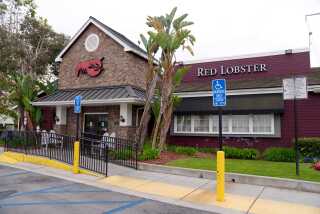Smog Fighters Zero In on Home Products
Smog-causing fumes from car waxes, carpet cleaners and a wide variety of other popular household products will be cut in half in California under a consumer products regulation unanimously adopted Thursday by the state’s air board.
Moe than 3,000 products--including automotive polishes, heavy-duty hand soaps, paint removers, metal polishes, spot removers, herbicides, lubricants, floor wax strippers and hair shine sprays--must meet the new pollution limits in the next 3 1/2 to eight years or they cannot be sold in California.
Many products that consumers have used for years will undergo major changes, and some may even disappear from store shelves. Also, the cost could rise on average a few cents per item--as much as 60 cents for some, according to the California Air Resources Board’s analysis. Californians buy an average of nine of the items each year.
It is the fourth time in the past decade that the Air Resources Board has tread into people’s bathrooms, kitchens and garages in an effort to clean up smog. The board started with deodorants in 1989, then imposed pollution limits in 26 other categories, including hair sprays, perfume, nail polish removers and bathroom cleaners, in 1990 and 1992.
Individually, household items add a minuscule amount of pollution to California’s air, but collectively they spew several hundred tons of hydrocarbons daily, about twice the amount wafting from oil refineries and gas stations.
The new measure will eliminate 16 tons of pollutants a day by 2005, equivalent to over a quarter-million cars on California’s roads. Hydrocarbons, when released into the atmosphere, combine with nitrogen oxides in sunlight to form lung-irritating ozone. They are often used in consumer products such as cleaning solvents and propellants.
In the works for over two years, the regulation covers 18 categories of products marketed or manufactured by 161 companies. About half of the estimated 3,400 products already comply; the rest must be reformulated to meet deadlines between 2001 and 2005.
Manufacturers say reformulation is a costly, difficult process. And although they have developed new recipes for many of the products, they are unsure whether they can alter some specialty items and still guarantee they work as well or provide all the same benefits.
Some new paste waxes for cars, for example, may take more time to apply, be less durable and leave an undesirable finish, such as smudges or less shine.
Small and family-owned businesses, in particular, could find it too difficult or costly to reformulate their products at an average cost of $50,000 per product. Several car-care companies told the board they may be forced out of business.
“In essence, companies will need to start from scratch to produce products acceptable to consumers,” said Aaron Lowe of the Automotive Parts and Accessories Assn. “These new formulas will mean changes to product performance and ease of application and therefore demand new packaging and advertising programs.”
R. Keith Green, president of Trak Auto, and Ron Lane of Chief Auto Parts warned that paste waxes, which are popular with consumers, may be forced off the market. The ruling may also spur a black market of products from Nevada or other states, they said.
“It will be difficult, if not impossible” to create a paste wax “which preserves the high degree of protection and ease of application demanded by our customers,” Green said.
Professional and premium car waxes and polishes have the highest probability of being eliminated.
“This is a serious challenge that we don’t know how to meet, and if we don’t meet it, we will be out of business,” said Barry Meguiar, owner of Meguiar’s, an Irvine car-care product company.
Dennis Holloway of Mothers Polish Co. in Huntington Beach told the board before its vote that the measure “is just scaring me to death. We’ll be gone.”
Other companies, including 3M Co., endorsed the measure, saying they already sell high-quality products that are low-polluting by replacing highly evaporative hydrocarbons with water-based formulas or other less reactive chemicals.
For example, 3M Perfect-It Paste Wax and Turtle Wax Super Hard Shell car wax already meet the new pollution standards, but Turtle Wax’s Minute Wax Silicone and Mother’s Carnauba Wax do not, the air board says. Shout carpet cleaner complies, but Resolve High Traffic cleaner does not.
Air board Chairman John Dunlap tried to reassure the companies by reminding them they have at least 3 1/2 years to meet the new limits--eight years in the case of the paste waxes. The board will create working groups with the car-care companies and will consider easing the deadlines in a couple of years if adequate products do not surface.
“It is not our intent to bankrupt people. . . . You have a lot of time,” Dunlap said. “We do have to ensure we are not costing people their business.”
An economic analysis by the air board staff shows that manufacturers’ profits will be reduced by around 2%, although the industries say the costs will cut much deeper.
No other state or region has regulated consumer products to clean the air, but no place else has skies so dirty that virtually every source must be tackled to achieve healthful air. California needs to cut fumes from all consumer products by 85% in order to meet national health standards for smog.
Thirteen other types of products, including disinfectants, dishwashing detergents and facial astringents, will be evaluated by the air board over the next year.
In another major vote Thursday, the air board required auto makers to ensure that new car models, beginning in 2001, meet California emission standards when tested at high speeds, during rapid acceleration or when the air-conditioning is used.
Pollutants can sometimes double during those real-world driving conditions, so the new tests will eliminate an extremely large amount of emissions--an estimated 133 tons per day in California by 2020.
In most cases, auto companies would modify engine software, but some cars will need changes in catalysts. The cost per car will be $30 to $40, making it one of the state’s most cost-effective smog rules.
Friday’s votes were the first major anti-smog measures that the Air Resources Board, which is responsible for regulating cars, trucks, fuel and other statewide sources of pollution, has enacted in several years. The board recently rolled back rules, including a controversial sales mandate for electric cars.
(BEGIN TEXT OF INFOBOX / INFOGRAPHIC)
Items to Be Reformulated
Under a state smog rule adopted Thursday, 18 types of consumer products must be reformulated to cut total emissions by 50%. The products release about 61,600 pounds of hydrocarbons into the air daily. In comparison, one pound per day is equivalent to the emissions of about nine average cars on California roads.
Products: Pounds per day
Automotive rubbing or polishing compounds: 2,020
Automotive wax, polish, sealant or glaze: 5,120
Bug and tar remover: 1,620
Carpet and upholstery cleaner: 2,040
Floor wax stripper: 6,400
Degreaser: 5,380
Hair shine: 1,180
Heavy-duty hand cleaner or soap: 6,000
Metal polish: 680
Multipurpose lubricant: 11,800
Terrestrial herbicide: 6,800
Paint remover or stripper: 4,000
Penetrant: 1,100
Rubber and vinyl protectant: 3,280
Silicone-based multipurpose lubricant: 1,480
Spot remover: 1,000
Undercoating: 480
Wasp and hornet insecticide: 1,280
Total: 61,600
Source: Air Resources Board






